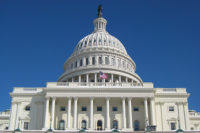These days, one has only to turn on a television, open a newspaper, or surf social media to be bombarded by news about presidential hopefuls. Even with the election some nine months away, election season is already in full swing and occupying an increasing portion of the country’s airwaves as candidates attempt to prove they are best suited for the job.
But, in addition to the presidency, there are many seats up for grabs at the state and local levels, and candidates will be diverting an increasing amount of their attention to drumming up votes leading up to Nov. 8. And, just as the 2016 elections are already having an impact on the country’s airwaves, many industry leaders agree they’ll also have a significant impact on both the regulatory and legislative environments impacting the HVACR industry through the end of the calendar year.
THE LEGISLATIVE CALENDAR
In 2014, the U.S. House of Representatives was scheduled to be in legislative session for 112 days. That number jumped to 132 in 2015 before falling off again to 111 days scheduled in 2016. That means Congress, in general, will average fewer than two days a week in session, which significantly impacts its ability to get things done, said Charlie McCrudden, senior vice president of government relations for ACCA.
“Typically, Congress adjourns during an election year in late September or early October to give members a chance to go back and campaign, and that, in the past, was when they were essentially done for the year,” McCrudden said, adding that the short calendar will likely necessitate a lame-duck session after elections. “There are several things they will have to renew, like the tax extenders. All the extenders, except the ones made permanent, will expire again at the end of the year, including 25C and the commercial building tax deduction. And, for the first time in a long time, the geothermal tax credit is expiring, though it’s likely to be extended.”
Jon Melchi, vice president of government affairs and business development for Heating, Air-conditioning, and Refrigeration Distributors International (HARDI), said elections absolutely have an impact on Congress’s ability to work on legislation, including energy-efficiency bills like HR 8, which passed the House in December. “The last few sessions of Congress have struggled to gain consensus with each other and the Obama Administration on a variety of issues. There was major progress at the end of December [with HR 8], but whether there’s enough appetite to have another bite, I would highly doubt it. But, there is an opportunity for piecemeal incremental legislation success.”
Guido Zucconi, assistant vice president of congressional affairs at Air-Conditioning, Heating, and Refrigeration Institute (AHRI), also suggested the shortened legislative session could make passing meaningful legislation especially difficult in 2016.
“I don’t think [Congress] can get any less efficient as a lawmaking body, but we’re looking at a very truncated window — more so than in a usual election year,” Zucconi said. “There are the conventions and the summer campaign season. Then, in the fall, they’ll do what’s necessary and then disappear for the elections, followed by a lame-duck session at the end of the year. You’re looking at about five months, so, the pressure’s on for things to get done in the first quarter — no later than March — on an energy bill that will be squeezed in between legislation that is politically dangerous but necessary, such as immigration reform.”
Still, there is a lot of interest in passing an energy bill, McCrudden said, adding that his organization supports a provision in HR 8 that reinstitutes the manufactured-by enforcement scheme for certain equipment.
“What this provision does is it takes away the uncertainty for inventory purposes created by the current installed-by enforcement scheme, which can result in stranded inventory problems and issues related to manufacturers who quit production early,” McCrudden said. “We’re going to work to get it in the Senate, and if it’s noncontroversial, that would be a big help, because, based on the term sheet that ASRAC [Appliance Standards and Rulemaking Federal Advisory Committee] did for central air conditioners and heat pumps, we’re looking at regional standards again.”
David Calabrese, vice president of government affairs, Daikin U.S. Corp., also said he expects Congress will attempt to pass energy legislation in 2016. Daikin is also monitoring HR 8, which would reform the procedures the U.S. Department of Energy (DOE) uses to develop new energy-efficiency standards. “Part of what we’re seeking is more transparency and clarity in the analysis that is conducted to establish these standards,” Calabrese said. “While this issue is more procedural than substantive, in our view, it’s still very important; the industry and the government must work together to approach these important issues.”
Despite the need for both parties to work together to pass meaningful legislation, many industry leaders expect more turbulence than usual this year as the two major political parties grapple for control of the House and Senate.
“I think you may see some small blowups in the House,” McCrudden said. “You’re certainly going to see more politically motivated legislation on the floor — bills designed and brought to the floor by Republicans to put Democrats on the record for voting on certain things. Usually, near the end of July and right before the August recess, something is brought to the floor that’s very controversial and a series of small skirmishes occur.”
David Underwood, president of ASHRAE, said he is hopeful bipartisan legislation, such as the Energy Policy Modernization Act and the Energy Savings and Industrial Competitiveness Act, will not be as susceptible to the volatile political climate of the election year. “Congress and the American people have repeatedly shown that there is much we all agree on,” he said. “Regardless of the outcomes of the elections, ASHRAE will continue its efforts to educate new and returning members of Congress to increase support for legislation that embodies these enduring values.”
REGULATORY ACTION
The elections later this year will also have an impact on regulatory action that is currently underway.
“The DOE is developing new energy-efficiency standards, and the U.S. Environmental Protection Agency [EPA] is evaluating changes to the Significant New Alternatives Policy [SNAP] program,” Calabrese said. “These federal agencies are working fervently to get these rulemakings completed this year because they don’t know the direction a new administration will take.”
Even if the Democratic Party holds onto the presidency, Calabrese said, the current regulatory priorities could change. “At the minimum, it is expected that current regulatory initiatives would be delayed as the new administration decides on its agenda. If the Republicans win the presidency, there will most likely be a dramatically different direction for environmental regulations than what we have today.”
Mark Riso, vice president of government relations, Plumbing-Heating-Cooling Contractors Association (PHCC), said that, whatever happens, it is important for regulatory agencies to continue to involve stakeholders. “In recent regulatory deliberations and actions — like the final furnace rule, expansion of lead paint regulations, and ‘Waters of the U.S.’ rule — the plumbing, heating, and cooling contractor’s voice has been heard because we’ve made sure we’ve had a seat at the table.”
ACCA is monitoring the proposed 92 percent AFUE furnace rule, which, if nothing changes, would effectively eliminate the noncondensing furnace in the U.S. “The stakeholders are meeting, and the DOE is still taking comments, so the process is ongoing,” McCrudden said. “If HR 8 does pass, great; it does provide us with a little more time to come to an agreement. But, if we came up with a recommendation that all parties signed off on, we could substitute that recommendation for the delaying provision. And, if that were to become law, problem solved.”
HARDI is also monitoring the enforcement scheme outlined in HR 8, said Melchi. “The challenge is, when it’s lumped in with other things, if anything there passes, it will be small and piecemeal,” Melchi said. “But, realistically, I don’t know that things get cherry-picked. Opinions are too divergent.”
Melchi added that he does not necessarily anticipate a significant change in the regulatory or legislative environments in 2016.
“There will be a lot of nibbling around the edges and hearing and posturing and looking to develop things for the next session of Congress in the next administration, but, by now, you know what this administration is going to do and not do,” he said. “Based on what I’ve heard from staffers, they will try to get done what they can this year, but there aren’t large hopes for anything major. Maybe we can actually hit the ground running in 2017 with some different proposals and a new environment with some leadership.”
LEAVING A LEGACY
Potentially complicating matters is the possibility the Obama administration might force through several regulations that have been postponed for various reasons.
“You typically see, in the last year of a president’s term, the release of a lot of pent-up regulations, and they’re tricky because it’s hard to undo them; sometimes it takes legislative action to undo regulations,” McCrudden said. “Everyone expects a number of rules to come out in the next seven to nine months. Some have been lingering for a long time, mostly from OSHA [Occupational Safety and Health Administration], the U.S. Department of Labor, and other agencies. So, I fully expect to see a number of what will be controversial rules released.”
McCrudden pointed to the recent release of the confined spaces rule as an example. “That was pending for eight or nine years, and it seemed like it was always about to come out, but then it finally did.”
“It’s clear [the president is] not completely satisfied with the current pace toward his goals, so it’s definitely possible that in his remaining time in office, he’ll use his executive powers to try to cement his legacy priorities,” Underwood agreed. “This makes it all the more important for robust dialogue to occur between the White House and all stakeholders.”
THE GOVERNMENT YOU DESERVE
The impact of elections on the HVACR industry is apparent, which is why many industry leaders are stressing the importance of staying abreast and voting accordingly.
“The old axiom is, people have the government they deserve,” Zucconi said. “If you want Congress to be more efficient, you have to pay attention to who’s running, and inform yourself before you cast your vote. Your personal politics don’t always match your business politics, so be careful what you wish for.”
PHCC’s Riso echoed Zucconi, saying the industry must elect senators and representatives who will support small businesses. “We certainly don’t expect members of Congress and their staffs to understand the details of the industry; however, we certainly expect they listen and show sound judgment in their decision-making.”
Underwood agreed with Riso that the “need to educate the sheer number of new elected and appointed officials at all levels of government who may not fully understand the unique and complex issues of the HVACR industry is probably one of the biggest challenges resulting from the elections.”
While the long-term effects of the 2016 elections on the HVACR industry can’t be known for perhaps years to come, industry leaders say there will most definitely be an impact, and it is up to HVAC professionals to become informed and do what they can to protect the industry’s interests.
To help keep the industry informed, AHRI maintains a regulatory support page, which can be accessed by the public for free at http://bit.ly/AHRIRegulatorySupport.
Publication date: 2/8/2016
Want more HVAC industry news and information? Join The NEWS on Facebook, Twitter, and LinkedIn today!








